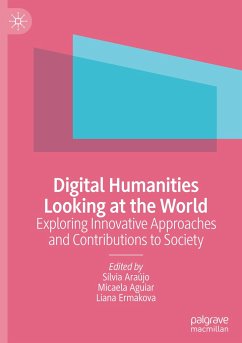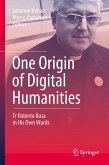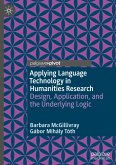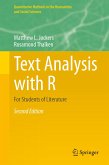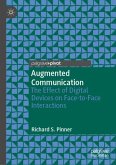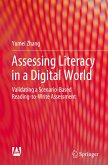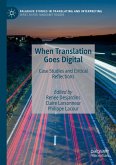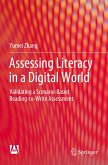Digital Humanities Looking at the World
Exploring Innovative Approaches and Contributions to Society
Herausgegeben:Araújo, Sílvia; Aguiar, Micaela; Ermakova, Liana
Digital Humanities Looking at the World
Exploring Innovative Approaches and Contributions to Society
Herausgegeben:Araújo, Sílvia; Aguiar, Micaela; Ermakova, Liana
- Gebundenes Buch
- Merkliste
- Auf die Merkliste
- Bewerten Bewerten
- Teilen
- Produkt teilen
- Produkterinnerung
- Produkterinnerung
This edited volume explores how digital humanities can address critical societal challenges in social media, health, education, archives, heritage, and the arts. It features contributions from leading scholars and practitioners in various fields, offering a comprehensive overview of the role of digital humanities in addressing pressing social and economic issues. Designed for scholars, researchers, and practitioners in digital humanities, social sciences, arts, and cultural studies, the book highlights the potential of digital technologies to tackle today's most urgent problems, making it a…mehr
Andere Kunden interessierten sich auch für
![One Origin of Digital Humanities One Origin of Digital Humanities]() One Origin of Digital Humanities75,99 €
One Origin of Digital Humanities75,99 €![Applying Language Technology in Humanities Research Applying Language Technology in Humanities Research]() Barbara McGillivrayApplying Language Technology in Humanities Research49,99 €
Barbara McGillivrayApplying Language Technology in Humanities Research49,99 €![Text Analysis with R Text Analysis with R]() Matthew L. JockersText Analysis with R60,99 €
Matthew L. JockersText Analysis with R60,99 €![Augmented Communication Augmented Communication]() Richard S. PinnerAugmented Communication41,99 €
Richard S. PinnerAugmented Communication41,99 €![Assessing Literacy in a Digital World Assessing Literacy in a Digital World]() Yumei ZhangAssessing Literacy in a Digital World97,99 €
Yumei ZhangAssessing Literacy in a Digital World97,99 €![When Translation Goes Digital When Translation Goes Digital]() When Translation Goes Digital90,99 €
When Translation Goes Digital90,99 €![Assessing Literacy in a Digital World Assessing Literacy in a Digital World]() Yumei ZhangAssessing Literacy in a Digital World97,99 €
Yumei ZhangAssessing Literacy in a Digital World97,99 €-
-
-
This edited volume explores how digital humanities can address critical societal challenges in social media, health, education, archives, heritage, and the arts. It features contributions from leading scholars and practitioners in various fields, offering a comprehensive overview of the role of digital humanities in addressing pressing social and economic issues. Designed for scholars, researchers, and practitioners in digital humanities, social sciences, arts, and cultural studies, the book highlights the potential of digital technologies to tackle today's most urgent problems, making it a valuable resource for those interested in harnessing digital innovation for societal benefit.
Produktdetails
- Produktdetails
- Verlag: Palgrave Macmillan / Springer Nature Switzerland / Springer, Berlin
- Artikelnr. des Verlages: 978-3-031-48940-2
- 2024
- Seitenzahl: 416
- Erscheinungstermin: 20. April 2024
- Englisch
- Abmessung: 216mm x 153mm x 27mm
- Gewicht: 625g
- ISBN-13: 9783031489402
- ISBN-10: 3031489403
- Artikelnr.: 69168946
- Herstellerkennzeichnung Die Herstellerinformationen sind derzeit nicht verfügbar.
- Verlag: Palgrave Macmillan / Springer Nature Switzerland / Springer, Berlin
- Artikelnr. des Verlages: 978-3-031-48940-2
- 2024
- Seitenzahl: 416
- Erscheinungstermin: 20. April 2024
- Englisch
- Abmessung: 216mm x 153mm x 27mm
- Gewicht: 625g
- ISBN-13: 9783031489402
- ISBN-10: 3031489403
- Artikelnr.: 69168946
- Herstellerkennzeichnung Die Herstellerinformationen sind derzeit nicht verfügbar.
Sílvia Araújo is an Assistant Professor at the University of Minho, Portugal, specializing in corpus linguistics, language technologies, and digital humanities. She leads FCT-funded projects (Perfide, PortLinguE) and IDEA-UMinho initiatives. Sílvia directs the Master's Degree in Digital Humanities, heads the Digital Humanities Research Group, and oversees the journal H2D. She contributes to journals like Myriades, PSIQUE, and Polissema and organizes the annual techLING conference on language technology. Micaela Aguiar is a post-doctoral researcher on the project PortLinguE, Multilingual Portal for Specialized Languages: mining open data for cross-language information retrieval, at the University of Minho, Portugal. She recently completed her Ph.D in linguistics, in the field of Discourse Analysis. Micaela Aguiar's research interest lies in digital humanities, corpus linguistics and NLP, which she hopes to explore further in her future work. Liana Ermakova, an associate professor at the University of Western Brittany since 2017, specializes in information retrieval, natural language processing, and AI. Her work encompasses evaluation metrics, information analysis, multi-document summarization, text simplification (SimpleText), and scientometrics. She leads the JOKER project (2021-2022), building a wordplay corpus. She's also active in organizing conferences, workshops, and AI competitions.
1 Digital Humanities Looking at the World: Introduction - Sílvia Araújo, Micaela Aguiar, and Liana Ermakova.- Part I Digital Humanities Looking at Social Media and News Media.- 2 Negative Comments Towards Formula 1 Drivers on Twitter - Vanessa Revheim Cunha, Violeta Barahona, and Fabio Passos.- 3 Abusive Name-Calling: Representations Around the Term Genocida During the COVID Pandemic - Yara Toledo Dias, Marcos Roberto de Oliveira, Natália Luri A. Ribeiro, and Paula Tavares Pinto.- 4 Storytelling and Journalism: Narratology of Two Social Movements in the French and Spanish Presses - Estéfano Rodríguez-Peláez.- 5 Enhancing Semantic Understanding by Bridging Topic Modeling and Thematic Analysis: An Empirical Study on Self-Help Twitter Corpus and In-Depth Interviews - Canan Urhan.- Part II Digital Humanities Looking at Art.- 6 The Language of Fashion from a Multidimensional Perspective - Katherine O. Ortolani.- 7 The Verbal Language of Video Games in a Multidimensional Perspective - Lucas Ferraz Escarabelin.- 8 The Verbal Language of the Visual Arts: A Multidimensional Analysis of the Discourse Around Sally Mann's Photography - Yara Toledo Dias.- Part III Digital Humanities Looking at Nature, Traveling and Tourism.- 9 Digital Humanities-Based Games: A Novel Approach for Mitigating Plant Awareness Disparity - Mariana Aparecida de Almeida Souza, Ana Cláudia de Macêdo Vieira, Thiago Eliezer Siqueira, Gabriel Lima Prisco Madureira, Pedro Vieira Cruz, Ana Paula Ribeiro de Carvalho Ferreira, Tatiana Ungaretti Paleo Konno, and Sérgio Manuel Serra da Cruz.- 10 Mapping Travel Writing: A Critical Digital Humanities Perspective - Luciano Moreira and Maria Zulmira Castanheira.- 11 GIS Multimedia Atlases for the Conservation and the Memory of the Coastal Environment in the Area of Ravenna - Marco Cornaglia and Arianna Mecozzi.- Part IV Digital Humanities Looking at Public Policies.- 12 Mission Statement Topic Models: Coherence, Diversity, and Utility - John M. Ford, J. Peter Leeds, and Sarah M. Kubosumi.- 13 Investigating Cybercrime in Brazil: A Transdisciplinary Analysis via Digital Humanities - Emerson de Barros Duarte, Sabrina Santos Cruz de Oliveira, and Sérgio Manuel Serra da Cruz.- 14 Conducting a Multivocal Systematic Literature Review About Compliance with the Brazilian Law for General Data Protection - Roberta Cláudia de Jesus Bordalo, Hugo do Val F. Fernandes, and Mônica Ferreira da Silva.- 15 Analysis of Online Electoral Advertising in 2022 Brazilian Elections Using Topic Modeling - Alessandra Gomes.- Part V Digital Humanities Looking at Science.- 16 A Portal for the Advancement of Open Science in the Humanities - Juliana Andreassa, Marcos Roberto de Oliveira, Renata Sant'Anna Lamberti, and Rafael Scarpelli.- 17 Named Entity Recognition for Classifying Technoscientific Persons: Combining Pre-trained Language Models and Silver Standard Datasets - Ahmet K. Süerdem and Samet Gümüs.- Part VI Digital Humanities Lookingat Health.- 18 Textual Analysis of Facebook Communities Related to Depression - Silas Lima Filho, Mônica Ferreira da Silva, and Jonice Oliveira.- 19 Opinion Mining in Mental Health: Users' (Many) Opinions at Your Fingertips - Renato Montaleão Brum Alves, Mônica Ferreira da Silva, and Élton Carneiro Marinho.- 20 Deep Learning-Based Context-Sensitive Typo Detection, Alteration in Clinical Notes - Challa Vijaya Madhavi Lakshmi and Tene Ramakrishnudu.- Part VII Digital Humanities Looking at Education.- 21 Technology Adoption in Teaching Students with ADHD: The Importance of Understanding Users' Context - Tainá Guimarães de Souza, Mônica Ferreira da Silva, and Renato Montaleão Brum Alves.- 22 A Brazilian Initiative Toward Digital Literacy: Evaluating the Impact of Motivational Factors on the Intention to Use a Distance Learning Platform - Élton Carneiro Marinho, Mônica Ferreira da Silva, Eber Assis Schmitz, Antônio Juarez Sylvio Menezes de Alencar, Nathália Miranda do Nascimento, andSérgio Manuel Serra da Cruz.- 23 Experiments with Distant Reading ... in Portuguese - Diana Santos.- Part VIII Digital Humanities Looking at Repositories and Archives.- 24 Evaluating the FAIRness of Scientific Data Repositories - Paulo V. C. Amaral, Frederico Alan de Oliveira Cruz, and Sérgio Manuel Serra da Cruz.- 25 Recognizing and Linking Named Entities in Portuguese Medieval Texts - Maria Inês Bico, Jorge Baptista, Fernando Batista, and Esperança Cardeira.- Part IX Digital Humanities Looking at Language.- 26 Exploring New Horizons in Word Sense Disambiguation and Topic Modeling: Potential of Deep Learning Based Transformers Models - Ahmet K. Süerdem.- 27 Exploring the Leipzig Corpora Collection in the LSP Classroom: A Data-Driven Approach -Teresa Alegre and Katrin Herget.- 28 Final Thoughts: Digital Humanities Looking at Generative AI - Micaela Aguiar and Sílvia Araújo.
1 Digital Humanities Looking at the World: Introduction - Sílvia Araújo, Micaela Aguiar, and Liana Ermakova.- Part I Digital Humanities Looking at Social Media and News Media.- 2 Negative Comments Towards Formula 1 Drivers on Twitter - Vanessa Revheim Cunha, Violeta Barahona, and Fabio Passos.- 3 Abusive Name-Calling: Representations Around the Term Genocida During the COVID Pandemic - Yara Toledo Dias, Marcos Roberto de Oliveira, Natália Luri A. Ribeiro, and Paula Tavares Pinto.- 4 Storytelling and Journalism: Narratology of Two Social Movements in the French and Spanish Presses - Estéfano Rodríguez-Peláez.- 5 Enhancing Semantic Understanding by Bridging Topic Modeling and Thematic Analysis: An Empirical Study on Self-Help Twitter Corpus and In-Depth Interviews - Canan Urhan.- Part II Digital Humanities Looking at Art.- 6 The Language of Fashion from a Multidimensional Perspective - Katherine O. Ortolani.- 7 The Verbal Language of Video Games in a Multidimensional Perspective - Lucas Ferraz Escarabelin.- 8 The Verbal Language of the Visual Arts: A Multidimensional Analysis of the Discourse Around Sally Mann's Photography - Yara Toledo Dias.- Part III Digital Humanities Looking at Nature, Traveling and Tourism.- 9 Digital Humanities-Based Games: A Novel Approach for Mitigating Plant Awareness Disparity - Mariana Aparecida de Almeida Souza, Ana Cláudia de Macêdo Vieira, Thiago Eliezer Siqueira, Gabriel Lima Prisco Madureira, Pedro Vieira Cruz, Ana Paula Ribeiro de Carvalho Ferreira, Tatiana Ungaretti Paleo Konno, and Sérgio Manuel Serra da Cruz.- 10 Mapping Travel Writing: A Critical Digital Humanities Perspective - Luciano Moreira and Maria Zulmira Castanheira.- 11 GIS Multimedia Atlases for the Conservation and the Memory of the Coastal Environment in the Area of Ravenna - Marco Cornaglia and Arianna Mecozzi.- Part IV Digital Humanities Looking at Public Policies.- 12 Mission Statement Topic Models: Coherence, Diversity, and Utility - John M. Ford, J. Peter Leeds, and Sarah M. Kubosumi.- 13 Investigating Cybercrime in Brazil: A Transdisciplinary Analysis via Digital Humanities - Emerson de Barros Duarte, Sabrina Santos Cruz de Oliveira, and Sérgio Manuel Serra da Cruz.- 14 Conducting a Multivocal Systematic Literature Review About Compliance with the Brazilian Law for General Data Protection - Roberta Cláudia de Jesus Bordalo, Hugo do Val F. Fernandes, and Mônica Ferreira da Silva.- 15 Analysis of Online Electoral Advertising in 2022 Brazilian Elections Using Topic Modeling - Alessandra Gomes.- Part V Digital Humanities Looking at Science.- 16 A Portal for the Advancement of Open Science in the Humanities - Juliana Andreassa, Marcos Roberto de Oliveira, Renata Sant'Anna Lamberti, and Rafael Scarpelli.- 17 Named Entity Recognition for Classifying Technoscientific Persons: Combining Pre-trained Language Models and Silver Standard Datasets - Ahmet K. Süerdem and Samet Gümüs.- Part VI Digital Humanities Lookingat Health.- 18 Textual Analysis of Facebook Communities Related to Depression - Silas Lima Filho, Mônica Ferreira da Silva, and Jonice Oliveira.- 19 Opinion Mining in Mental Health: Users' (Many) Opinions at Your Fingertips - Renato Montaleão Brum Alves, Mônica Ferreira da Silva, and Élton Carneiro Marinho.- 20 Deep Learning-Based Context-Sensitive Typo Detection, Alteration in Clinical Notes - Challa Vijaya Madhavi Lakshmi and Tene Ramakrishnudu.- Part VII Digital Humanities Looking at Education.- 21 Technology Adoption in Teaching Students with ADHD: The Importance of Understanding Users' Context - Tainá Guimarães de Souza, Mônica Ferreira da Silva, and Renato Montaleão Brum Alves.- 22 A Brazilian Initiative Toward Digital Literacy: Evaluating the Impact of Motivational Factors on the Intention to Use a Distance Learning Platform - Élton Carneiro Marinho, Mônica Ferreira da Silva, Eber Assis Schmitz, Antônio Juarez Sylvio Menezes de Alencar, Nathália Miranda do Nascimento, andSérgio Manuel Serra da Cruz.- 23 Experiments with Distant Reading ... in Portuguese - Diana Santos.- Part VIII Digital Humanities Looking at Repositories and Archives.- 24 Evaluating the FAIRness of Scientific Data Repositories - Paulo V. C. Amaral, Frederico Alan de Oliveira Cruz, and Sérgio Manuel Serra da Cruz.- 25 Recognizing and Linking Named Entities in Portuguese Medieval Texts - Maria Inês Bico, Jorge Baptista, Fernando Batista, and Esperança Cardeira.- Part IX Digital Humanities Looking at Language.- 26 Exploring New Horizons in Word Sense Disambiguation and Topic Modeling: Potential of Deep Learning Based Transformers Models - Ahmet K. Süerdem.- 27 Exploring the Leipzig Corpora Collection in the LSP Classroom: A Data-Driven Approach -Teresa Alegre and Katrin Herget.- 28 Final Thoughts: Digital Humanities Looking at Generative AI - Micaela Aguiar and Sílvia Araújo.

